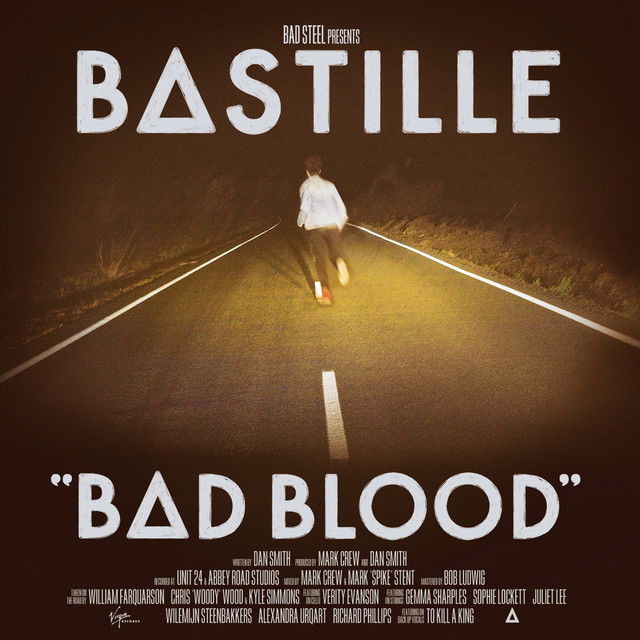Song Stories: Bastille: Pompeii
Bastille’s hit single 'Pompeii' became an instant anthem. Released as the third single from their debut album 'Bad Blood' in 2013, 'Pompeii' quickly cemented itself as one of the band’s most iconic tracks. But beyond the catchy melody and upbeat rhythms, there’s a deeper narrative to explore. One that reveals a fascinating blend of history, existential thought, and the beginning of Bastille’s remarkable rise to fame.
The name ‘Pompeii’ immediately conjures images of the ancient Roman city that was tragically buried under volcanic ash after Mount Vesuvius erupted in 79 AD. For Bastille, this historical tragedy serves as a vivid metaphor for the feeling of being stuck in time, overwhelmed by inevitable change, and helpless in the face of forces beyond one’s control.
Dan Smith, Bastille's lead vocalist and principal songwriter, has often spoken about his fascination with history and storytelling. 'Pompeii' reflects this fascination, using the imagined conversations of the city's frozen inhabitants as a framework to explore larger themes of inertia, regret, and helplessness. It's a rare pop song that invites listeners to look both backward and inward, contemplating the ways we too can become trapped, whether by circumstance, complacency, or fear of change.
By choosing such a weighty subject matter, Bastille proved early on that they were willing to take creative risks, blending ancient tragedy with modern synth-pop sensibilities.
The lyrics of 'Pompeii' are packed with vivid, haunting imagery that mirrors the static final moments of Pompeii’s citizens, yet feel startlingly relatable in a contemporary context.
Opening with “I was left to my own devices”, the song immediately sets a tone of abandonment and introspection. As the song progresses, it becomes clear that 'Pompeii' isn’t just about historical events it's about feeling overwhelmed by personal catastrophe, by the cycles of poor decisions and stasis that everyone experiences at some point.
The repeated question, “How am I gonna be an optimist about this?”, feels like a desperate, almost rhetorical cry for hope amid devastation. And yet, wrapped in the buoyant production and singalong choruses, it offers a strange kind of catharsis a recognition that even in our worst moments, there’s beauty in confronting our failures and uncertainties.
It’s this emotional layering that makes 'Pompeii' so timeless. It's a song that mourns the past, questions the present, and doubts the future, all while pulsing with an energy that suggests survival

Bastille’s use of Pompeii’s destruction as a metaphor is a masterstroke in blending history with human emotion. Instead of focusing on the literal devastation caused by Vesuvius, 'Pompeii' imagines a surreal conversation between the town’s ash-preserved victims, asking existential questions about change and survival.
Dan Smith has said that he liked the idea of two people frozen in time having a chat about how everything had gone wrong. In this light, Pompeii becomes more than a historical event; it becomes a symbol for paralysis. In an era saturated with surface-level pop, 'Pompeii' stands out for its willingness to connect listeners to something ancient, somber, and universal. History isn't just a backdrop here; it's a living, breathing metaphor that adds weight to every beat and every lyric.
One of the most compelling aspects of 'Pompeii' is how it pairs its heavy thematic content with an irresistibly upbeat, almost celebratory soundscape.
The track features tribal drums, chanted backing vocals, sweeping synths, and a driving bassline that together create a sense of urgency and uplift. It’s almost paradoxical, dancing through destruction, but that contrast is exactly what gives 'Pompeii' its staying power. It’s a song you can belt out with friends at a festival or quietly mull over alone with headphones in the dark.
Bastille's knack for balancing pop accessibility with lyrical depth is nowhere clearer than here. They pull listeners into complex emotional terrain without weighing them down, offering a soundtrack for both the highs and the lows of life.
'Pompeii' was a standout track on Bastille’s debut album 'Bad Blood', which arrived in March 2013. The album was a breath of fresh air at the time, mixing indie rock sensibilities with lush electronic production and orchestral flourishes.
Across the album, Dan Smith’s writing shines with cinematic ambition, drawing on myth, history, heartbreak, and identity. Songs like 'Things We Lost in the Fire', 'Laura Palmer', and 'Oblivion' continued the pattern established by 'Pompeii' songs that feel big, even as they tell intensely personal stories.
'Bad Blood' debuted at number one on the UK Albums Chart and became one of the defining records of the 2010s indie-pop movement. It was praised for its cohesiveness, emotional honesty, and sonic inventiveness, marking Bastille as not just a fleeting success, but a band with serious staying power.
Following the release of 'Pompeii' and 'Bad Blood', Bastille experienced a meteoric rise. 'Pompeii' alone became a global sensation, charting in over 15 countries and peaking at number five on the US Billboard Hot 100. An incredible feat for a debut-era British indie band.
Their success was fueled by relentless touring, engaging live performances, and a connection with fans who appreciated their thoughtful approach to pop music. Bastille weren’t flashy; they weren’t overly polished.

Accolades soon followed: they won the BRIT Award for Best Breakthrough Act in 2014, and 'Bad Blood' was certified multi-Platinum in both the UK and the US. Bastille proved that pop music could be smart, soulful, and sophisticated without sacrificing mass appeal.
‘Pompeii’ isn’t just another radio hit; it's a profound exploration of time, tragedy, and human resilience wrapped in a beat you can't help but move to. It shows Bastille’s early commitment to making music that matters songs that challenge as much as they entertain.
Through 'Pompeii' and the 'Bad Blood' era, Bastille established themselves not just as a band to watch, but as a voice for a generation grappling with uncertainty and longing for connection. Whether you’re dancing at a festival or quietly contemplating life’s twists and turns, 'Pompeii' remains a timeless anthem.
Thank you for reading
Jack